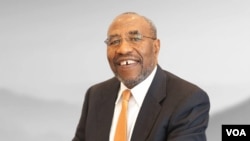Uganda’s Prime Minister Ruhakana Rugunda is pledging that next year's elections will be free and democratic.
“The people of Uganda should expect a free, peaceful and democratic election that will give them their leaders for the president, parliament and district level and to the grass roots,” he said.
Opposition and civil society groups have accused the government of using security forces to harass potential challengers to President Yoweri Museveni.
Former Prime Minister Patrick Amama Mbabazi and longtime opposition leader Kizza Besigye were both recently arrested ahead of planned meetings with their supporters. Opposition groups say the administration is narrowing the political space to ensure its continued stay in power.
But Rugunda disagreed.
“[T]here are laws that govern meetings around this time of elections, and all we are saying is that these laws should be respected by the candidates when they are consulting with the population,” Rugunda said.
The electoral commission recently released a voters list it compiled to allow eligible voters to verify their information on the register.
Opposition groups say the list should be scrapped for a fresh one, accusing the electoral body of lacking transparency in the process.
But Rugunda expressed confidence that the list would be credible.
“Without any doubt, this is going to be the best voters register ever produced in Uganda. It will have not only photographs, but other biometric parameters that can be used to ensure the voter is indeed the voter, and nobody is trying to cut out fraud and around elections. ... And we believe that with a good register, you have laid a good foundation for a free and fair election,” he said.
Rugunda, who was at the United Nations this week to commemorate the life, contribution and legacy of Nelson Mandela, called on Ugandans to be ready for the elections.
Museveni was recently appointed by regional leaders to help mediate peace talks between the government in Burundi and opposition groups following the political crisis in the East African country. The crisis has forced an estimated 170,000 Burundians to flee to neighboring countries.
“Uganda and the East African region and, I believe, the international community would like to see a peaceful resolution of some of the issues that have caused the tension in Burundi,” Rugunda said.
“[Museveni] has energetically stated his work and he is being assisted by the minister of defense of Uganda, and we believe that the peace process is essentially on course. We would like to see the Burundians resolve their issues, and sort out their house with support of the region and the international community.”





